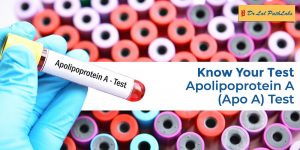Essential Blood Tests to Diagnose High Blood Pressure
- 22 Jun, 2024
- Written by Team Dr Lal PathLabs
Medically Approved by Dr. Seema
Table of Contents

High blood pressure, or hypertension, is a common condition that can result in cardiovascular diseases, kidney problems, and other health issues. Diagnosing hypertension involves measuring blood pressure and understanding the underlying causes and effects on the body.
Blood tests play a key role in the high blood pressure diagnosis process. This article discusses the essential blood tests used to diagnose and manage high blood pressure.
What are the signs of high blood pressure?
In most cases, people with high blood pressure experience no symptoms, and measuring the blood pressure using a sphygmomanometer is one of the ways to diagnose. However, if the blood pressure measures 180/200 mm Hg, the condition may become critical, and the person might experience the following high blood pressure symptoms:
- Nausea and vomiting
- Headaches
- Dizziness
- Nose bleeding
- Blurred vision
- Breathlessness
- Heart Palpitations
- Chest pain or tightness
How is blood pressure measured?
To diagnose high blood pressure, the healthcare provider will measure blood pressure and ask questions about the individual’s symptoms or medical history. The blood pressure will be checked using the sphygmomanometer, where the cuff is placed securely around the arm.
The cuff is inflated to a higher pressure than the systolic blood pressure, which will cause it to tighten around the arm. The pressure is then released to determine the diastolic blood pressure.
If the reading measures the diastolic blood pressure between 80-89 or higher than 90, the individual has stage 1 and stage 2 high BP, respectively. In this case, the healthcare professional might recommend further blood tests to assess organ function and evaluate cardiovascular risk.
What are the essential blood tests for high blood pressure diagnosis?
- Complete blood count (CBC)
A Complete Blood Count (CBC) is a fundamental blood test for BP that measures different components of blood, including red blood cells, white blood cells, and platelets. While CBC cannot directly help diagnose high BP, it can offer insights into individual’s health and detect conditions like anemia, which can indirectly affect blood pressure.
If the patient is found to be anaemic, doctors can help address the underlying causes to lower the risk of heart attack and kidney damage due to high BP.
- C-reactive protein (CRP)
C-reactive protein (CRP) is an indicator of inflammation, linked to atherosclerosis and hypertension. Chronic inflammation increases the risk of cardiovascular diseases. Monitoring the CRP levels provides additional information about cardiovascular risk in hypertensive patients and guides preventive measures.
- Lipid profile
A lipid profile measures cholesterol and triglyceride levels in the blood. This test includes total cholesterol, low-density lipoprotein (LDL) cholesterol, high-density lipoprotein (HDL) cholesterol, and triglycerides. High cholesterol levels can damage and harden the arteries, leading to atherosclerosis and increasing the risk of high blood pressure and heart attack.
- Fasting blood glucose and hemoglobin A1c (HbA1c)
Blood glucose tests measure the amount of sugar in the blood and are important blood tests for high blood pressure. Fasting blood glucose provides immediate glucose levels, while HbA1c reflects average blood glucose levels over the past two to three months.
High glucose levels can damage blood vessels, contributing to high BP and increasing the risk of cardiovascular conditions like stroke. These tests are essential for diagnosing diabetes or prediabetes in hypertensive patients.
- Thyroid function tests
Thyroid function tests assess thyroid gland function, including Thyroid-Stimulating Hormone (TSH) and thyroxine (T4). Hypothyroidism (underactive thyroid) and hyperthyroidism (overactive thyroid) can both influence blood pressure. Hypothyroidism often leads to diastolic hypertension, while hyperthyroidism can cause systolic hypertension. By evaluating thyroid function, doctors can determine if thyroid dysfunction is contributing to high blood pressure and plan treatment accordingly.
- Electrolyte tests
An electrolyte test does not diagnose high BP but measures the levels of key electrolytes such as sodium, potassium, chloride, and bicarbonate in the blood. These electrolytes are vital for maintaining fluid balance, nerve function, and muscle contractions, all of which influence blood pressure. For instance, an imbalance in sodium and potassium levels can affect blood pressure regulation.
Blood tests are necessary for diagnosis and management of high blood pressure. They help identify underlying causes, assess organ function, and determine cardiovascular risk. Regular monitoring and early detection of high blood pressure through blood tests for BP can significantly improve patient outcomes and reduce the risk of associated complications such as kidney damage or heart attack.
As a result, it is important to consult a healthcare professional for a timely diagnosis and get the blood tests done at Dr. Lal Path Labs.
FAQs
1. Why are blood tests important for diagnosing high blood pressure?
Blood tests for high blood pressure help identify underlying conditions, assess organ function, and evaluate cardiovascular risk, ensuring accurate diagnosis and effective treatment for individuals.
2. Can blood tests alone diagnose high blood pressure?
No, blood tests are combined with blood pressure readings and other diagnostic tools to evaluate the overall health and identify potential complications of high blood pressure.














